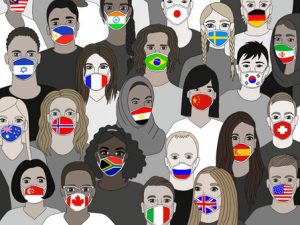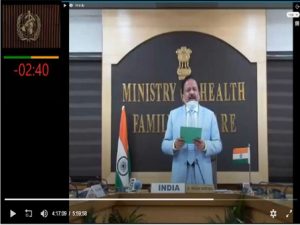Will Future COVID-19 Vaccine be a Global Public Good? World Health Assembly Shies Away
President Xi’s announcement committing to declare COVID-19 vaccine a public good was considered as a move to isolate the US, which has taken steps to control exports of experimental treatments and also to secure exclusive access to the vaccine.

The 73rd World Health Assembly (WHA73), in its two-day virtual session, hosted from Geneva, was fully devoted to discussions on the access to health and the universal health coverage agenda. More than 122 countries supported the call for universal, timely and equitable access for vaccines and other COVID-19 pandemic management tools. There was little stress on the other aspects of the crisis such as the call for the evaluation of the WHO’s performance in COVID-19 response, review of health measures taken up by the member-states, international migration governance, or the economic impact of the pandemic on developing and least-developed countries.
Delegates in the session used terms like “global public good” and “Universal Common Good” to characterise the COVID-19 vaccine to be developed. Almost all the nations spoke with a single-point agenda – “Access to Health for All”. The US–China politics, which was expected to overshadow the deliberations, also could not drift away the focus of the global community of nations. Their call for global solidarity, co-operation, co-ordination and unity echoed in the World Health Assembly webcast without any interruptions. “Science, Solutions and Solidarity” became the new mantra of global governance agenda.
Also Read : Covid 19 An Opportunity To Fix Dysfunctional Biomedical Rd System
Keva Bain, the Bahamas’ representative to the United Nations, presided over the session. The President of the Swiss Confederation, Simonetta Sommaruga, who opened the High-Level welcome, stressed upon the need to strengthen WHO and not to undermine it. She called for the analysis of the actions taken by different countries in accordance with the International Health Regulations 2005 (IHR 2005), the legal text which explains the role, functions and powers of WHO, with regard to public health emergency management. Japan, South Korea and Global Health Security Agenda (GHSA), which is an international partnership to advance a world safe and secure from infectious disease threats, represented by The Netherlands also mentioned the need to analyse the implementation of IHR 2005. Beyond this, the word “evaluation” hardly attracted any attention of the World Health Assembly. The US agenda to criticise WHO for its alleged China-centric approach was played down by the rest of the world.
Resonating with the global conscience, Dr. Tedros, the Director-General of WHO, during his opening statement, asked three questions of introspective significance to global humanity: a) How do you practice physical distancing when you live in crowded conditions?; b) How do you stay at home when you have to work to feed your family?; and c) How do you practice hand hygiene when you lack clean water?
Pitching the idea of “universal health coverage” into the central stage of discussion, Dr. Tedros, reminded that “we’re learning the hard way that health is not a luxury; it’s a necessity.” He further said that “health is not a reward for development; it is a prerequisite. Health is not a cost; it’s an investment. Health is a pathway to security, prosperity and peace.”
Xi Jinping and Emmanuel Macron, Presidents of China and France, respectively, reiterated that the COVID-19 vaccine should be declared as a global public good.

South Korea emphasised the same and said “sharing of the information” is the only special power, which the global humanity possesses against the current emergency. Germany made a step ahead by calling for WHO to design an equitable distribution plan of COVID-19 vaccines. Interestingly, President Xi’s announcement committing to declare COVID-19 vaccine a public good was considered as a move to isolate the US, which has taken steps to control exports of experimental treatments and also to secure exclusive access to the vaccine. The US’ opening statement didn’t touch upon the issues of patents or that of Universal Health Coverage. It further issued an opposition to the paragraphs in WHA Resolution on COVID-19 Response, which called for the universal, timely and equitable access to and fair distribution of all quality, safe, efficacious and affordable essential health technologies and products including their components and precursors required in the response to the COVID-19 pandemic.
Indian Health Minister Dr Harsh Vardhan’s opening statement, ironically, didn’t use the phrases such as “global public good”, or “universal health coverage”. In his statement, he did not call for an independent evaluation either of the actions of WHO or of the actions of any member-states. He said that the governments, industry and philanthropy should pool their resources to pay for the risk, the research, manufacturing and distribution of COVID-19 tools on a condition that the rewards should be available to everyone, regardless of where they have been developed. India, later on 19 May 2020 got elected in to the Executive Board of WHO.
The only voice seemingly interested in any sort of restructuring of WHO and highlighting its alleged failures was that of the US. Japan who seconded the US in stressing the need for impartial, independent and comprehensive evaluation to review WHO’s response, but adopted a future oriented approach rather than criticising WHO or its alleged China-centric approach.
Also Read : Covid 19 And Toilet Use In India Why Continued Attention Is Needed
Japan looked at the need to identify the source of the virus and its route of transmission in order to prevent next pandemic.
Meanwhile, the US President is reported to have sent out a letter to Dr Tedros, as an ultimatum for him and WHO to commit major substantive improvements within 30 days. However, the impact of the same was not visible during the sessions of World Health Assembly, which extended for more than 13 hours on 18 May and 4 hours on 19 May.
The Resolution on COVID-19 Response, which is sponsored by the EU and other member-states including India, was adopted unanimously on the second day. The resolution, though calls for an independent, impartial and comprehensive evaluation of WHO’s performance, is neither critical about WHO’s work so far, nor it calls for inquiry into actions of any member-states during the pandemic crisis. All eyes are on the operative paragraphs 4, 6, 8.2, and 9.8. of the resolution, which deals with global access to affordable diagnostics, therapeutics, medicines and vaccines for the COVID-19 response.
However, even the rhetoric of “global public good” is not free from criticism. Several public health scholars and activists opine that it is an “academic” term and certain clarity is required on the implications of its use. Quoting Ellen T’Hoen, a public health advocate, K M Gopakumar of Third World Network (TWN), said that the term and its rhetoric do not provide concrete details on how to achieve universal access or address how the intellectual property and knowhow related to the products will be made available to all humankind. Moreover, the resolution doesn’t seek to deviate from the TRIPS model. It has called for a consistent approach in patent pooling to the provisions of relevant international treaties including the provisions of the TRIPS agreement and the flexibilities as confirmed by the Doha Declaration on the TRIPS Agreement and Public Health. This means the resolution may not be able to rescue the vaccine from the politics and commercial interests that may arise once it is developed. TWN reported that the resolution adopted at the World Health Assembly, contrary to the popular belief, does not treat future COVID-19 vaccines as a global public good.
